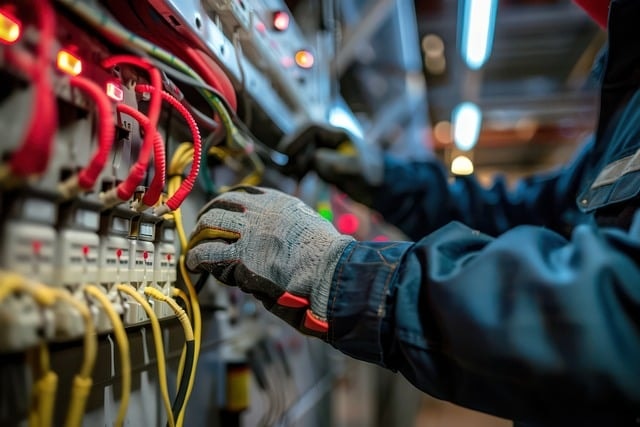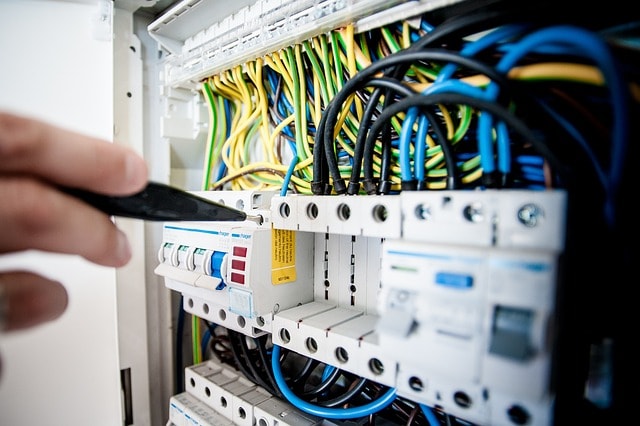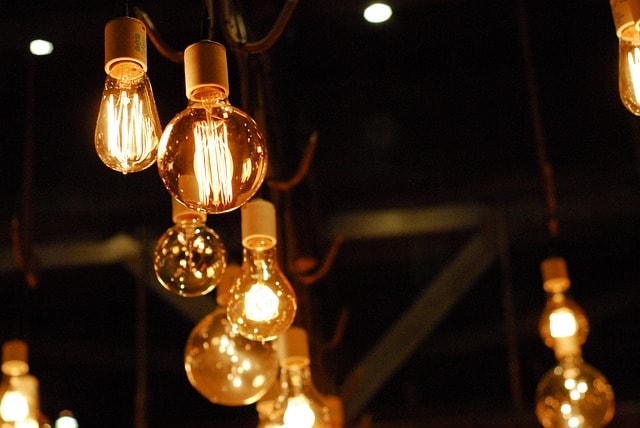Are you needing electrical repair services?
Home is where the heart is, but it’s also where electrical issues can lurk unseen. Did you know that faulty electrical systems are among the leading causes of home fires? According to the National Fire Protection Association, electrical failures or malfunctions were responsible for an estimated 44,880 home fires in the US between 2012 and 2016.
This statistic underscores the importance of timely electrical repairs to ensure your home’s safety. In this blog post, we’ll explore the critical aspects of home electrical repairs, including how to identify problems, and common issues, and the necessity of hiring a professional electrician.

"*" indicates required fields
Signs Your Home Needs Electrical Repairs
Electrical issues can manifest in various ways, and recognizing the signs early can prevent more severe problems down the line.
Here are some common indicators that your home may need electrical repairs:
Flickering Lights
Flickering lights can be more than just an annoyance; they often indicate a more significant underlying issue. It could be something as simple as a loose bulb, or it could point to more severe problems like outdated wiring or overloaded circuits.
Tripped Circuit Breakers
Circuit breakers are designed to protect your electrical system from overloads. If your circuit breakers trip frequently, it’s a sign that your electrical system is struggling to handle the load. This situation calls for immediate attention to avoid potential hazards.
Warm Outlets or Switches
Have you noticed that your outlets or switches feel warm to the touch? This can be a sign of faulty wiring or an overloaded circuit. Warmth indicates that too much power is flowing through the outlet, which can lead to dangerous outcomes if not addressed promptly.

Common Electrical Issues in Homes
Several common electrical problems can plague homes, and understanding them can help you recognize when it’s time to call in a professional.
Outdated Wiring
Older homes often come with outdated wiring systems that may not meet current safety standards. Aluminum wiring, for example, was widely used in homes built between the 1960s and 1970s.
While it was initially considered a cost-effective alternative to copper wiring, it has since been found to pose a significant fire hazard due to its tendency to overheat and oxidize.
Overloaded Circuits
Overloaded circuits occur when too many devices are plugged into a single circuit, causing it to exceed its capacity.
This can lead to tripped circuit breakers, flickering lights, and even electrical fires. Regular inspections by experienced technicians can help identify and rectify overloaded circuits before they become a problem.
Faulty Outlets
Faulty outlets can pose a severe risk to your home and family.
If you notice sparks, or burnt marks, or hear buzzing sounds coming from an outlet, it’s crucial to have it inspected and repaired immediately.

DIY vs. Professional Repairs
When it comes to electrical repairs, safety should always be the priority.
While some minor tasks can be handled by homeowners, others require the expertise of a professional electrician.
Safety Considerations for DIY Repairs
DIY electrical repairs can be tempting, especially for those who enjoy hands-on projects. However, it’s essential to understand the risks involved.
Electrical work can be hazardous, and improper repairs can lead to severe injuries or even death. Always ensure you have the necessary knowledge and tools before attempting any DIY electrical work.
When to Call a Professional
Certain electrical issues should always be left to the professionals. These include replacing or installing new wiring, fixing circuit breakers, and addressing significant power outages.
Hiring a licensed electrician ensures that the job is done correctly and safely.
How to Discern Between the Two
If you’re unsure whether a repair is suitable for DIY, consider the complexity and potential risks involved.
Simple tasks like replacing a light switch cover may be safe for DIY, while anything involving wiring or circuit breakers should be handled by a professional.
Types of Electrical Repair
Electrical repairs encompass a variety of services that are essential for maintaining safety and functionality in homes and vehicles.
Here are some common types of electrical repairs:
- Alternator Repair: Fixing issues related to the alternator in vehicles, ensuring proper power generation for the engine and battery.
- Circuit Repair: Diagnosing and repairing a faulty circuit breaker to prevent electrical malfunctions and maintain safe operation.
- Smoke Detectors: Testing and replacing smoke detectors to ensure they are working properly in detecting fire hazards.
- Carbon Monoxide Alarms: Installing and servicing carbon monoxide alarms to help prevent poisoning risks in homes.
- Appliance Repair: Diagnosing and fixing an electrical problem in household appliances to restore their functionality.
- Lighting Repair: Troubleshooting and repairing lighting fixtures to ensure proper operation and safety.
- Fuses Replacement: Identifying and replacing blown fuses to restore power and prevent further electrical issues.
- Diagnostics for Malfunctions: Using specialized tools to determine the source of electrical problems in engines and other systems.
By understanding these types of repairs, homeowners and vehicle owners can take proactive measures to ensure their electrical systems are safe and efficient.

The Dangers of Electrical Repair
Repairing electrical systems can be hazardous if proper safety protocols are not followed. Here are some key dangers associated with electrical repair work:
- Electric Shock – Working with live wires can cause serious injury or death from electric shock.
- Arc Flash – This sudden release of electrical energy can result in burns and other injuries.
- Fire Hazards – Faulty wiring can lead to electrical fires, endangering lives and property.
- Falling Hazards – Working at heights in unsafe conditions can lead to falls.
- Injuries from Tools – Improper use of tools can cause cuts, bruises, or more serious injuries.
- Inadequate Knowledge – Lack of proper training can lead to errors and unsafe practices.
- Equipment Failure – Working on damaged equipment can exacerbate problems and increase danger.
- High Voltages – Exposure to high-voltage systems requires stringent safety measures to prevent injury.
- Chemical Hazards – Some electrical work may involve exposure to hazardous materials.
- Overloading Circuits – Incorrectly repairing circuits can lead to overloading, fires, or further damage.
For more information, consider these resources:
- National Electrical Code (NEC)
- Electrical Safety Foundation International (ESFI)
- The Dangers of DIY Electrical Repairs
- Electrical Shock Prevention
- How to Avoid Electrical Hazards
- Understanding Arc Flash
- Electrical Work Safety Tips
- Common Electrical Safety Mistakes
- Electrical Repair Safety Guidelines

The Electrical Repair Process
Understanding what to expect during an electrical repair can help ease any anxieties you may have.
Here’s a step-by-step breakdown of the typical electrical repair process:
Initial Inspection
The first step in any electrical repair is a thorough inspection of your electrical system.
A professional electrician will assess the condition of your wiring, outlets, and circuit breakers to identify any issues that need attention.
Diagnostic Testing
Once the inspection is complete, the electrician will perform diagnostic tests to pinpoint the exact cause of the problem.
This may involve using specialized tools to measure voltage, current, and resistance within your electrical system.
Repair and Replacement
Based on the findings from the inspection and diagnostic tests, the electrician will proceed with the necessary repairs or replacements.
This could involve replacing faulty wiring, fixing damaged outlets, or upgrading your circuit breakers to handle the electrical load better.

Tips for Finding and Hiring a Reliable Electrician
Hiring a reliable electrician is crucial to ensuring the safety and efficiency of your electrical repairs.
Here are some tips to help you find the right professional for the job:
Check Qualifications and Credentials
Always verify that the electrician you hire is licensed and insured.
This ensures they have the necessary training and knowledge to perform electrical work safely and effectively.
Ask for References and Reviews
Ask for references from previous clients or check online reviews to get a sense of the electrician’s reputation.
Positive feedback from satisfied customers can provide peace of mind that you’re hiring a trustworthy professional.
Get Multiple Quotes
Don’t settle for the first electrician you find. Get quotes from multiple professionals to compare prices and services.
This will help you make an informed decision and ensure you’re getting the best value for your money.

Conclusion
Timely electrical repairs are essential for maintaining the safety and functionality of your home.
From recognizing the signs of electrical problems to understanding the repair process and knowing when to call a professional, taking proactive steps can help you avoid potentially dangerous situations.
Regular maintenance and inspections by experienced technicians can further ensure that your electrical system remains in top condition.
If you need help with electrical repairs, please reach out to us at Blue Ridge Handyman. We’re the professional you need to keep your lights shining bright.



